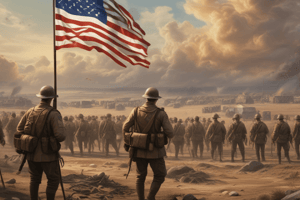Podcast
Questions and Answers
What did the Neutrality Act of 1937 forbid Americans from doing?
What did the Neutrality Act of 1937 forbid Americans from doing?
- Traveling on ships of nations at war (correct)
- Engaging in military operations
- Trading with all foreign nations
- Buying goods from other countries
What does 'cash and carry' refer to?
What does 'cash and carry' refer to?
A policy allowing Britain and France to buy goods from the United States if they paid in full and transported them.
What was the main outcome of the Munich Conference in 1938?
What was the main outcome of the Munich Conference in 1938?
Germany was given control of the Sudetenland.
The Sudeten problem refers to Britain and France giving in to Hitler's demands in 1938.
The Sudeten problem refers to Britain and France giving in to Hitler's demands in 1938.
What event occurred on September 1, 1939?
What event occurred on September 1, 1939?
What is blitzkrieg?
What is blitzkrieg?
Who was Wendell Willkie?
Who was Wendell Willkie?
What significant event happened on December 7, 1941?
What significant event happened on December 7, 1941?
Flashcards are hidden until you start studying
Study Notes
Neutrality Act of 1937
- Extended previous Neutrality Acts to include nations in civil conflict, aiming to prevent American involvement.
- Prohibited Americans from traveling on ships of warring nations and barred arming US merchant ships.
- Mandated that goods be traded on a cash and carry basis, limiting trade to immediate cash payments and transportation by the buyer.
Cash and Carry
- Implemented in 1939 as a strategy to maintain American neutrality while supporting Allied nations.
- Allowed Britain and France to purchase goods from the US, requiring full payment upfront and the responsibility for transport.
Munich Conference
- A significant 1938 meeting involving British, French, and German leaders addressing German territorial claims.
- Resulted in Germany acquiring the Sudetenland from Czechoslovakia in exchange for a promise of no further territorial expansion in Europe.
Sudeten Problem
- Refers to the events in September 1938 when Britain and France conceded to Hitler’s demands.
- This concession involved the dismemberment of Czechoslovakia, specifically incorporating the Sudetenland into Nazi Germany.
Poland - September 1939
- Marked by the German invasion of Poland on September 1, 1939, which ended the period known as the "Long Armistice."
- This act of aggression was a pivotal moment leading to the outbreak of World War II.
Blitzkrieg
- Translates to "lightning war," describing a rapid and intense military offensive strategy employed by Germany.
- First effectively used against Poland in 1939, characterized by swift and coordinated attacks utilizing air and ground forces.
Wendell Willkie
- A prominent Wall Street lawyer and lifelong Democrat who opposed FDR in the 1940 presidential election.
- Advocated for the establishment of what would become the United Nations, promoting international cooperation.
December 7, 1941
- Date of the surprise attack by Japan on the US naval base at Pearl Harbor, occurring at 7:55 AM.
- This event prompted a significant shift in American foreign policy and marked the US entry into World War II.
Studying That Suits You
Use AI to generate personalized quizzes and flashcards to suit your learning preferences.




